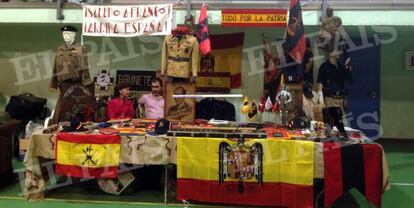Madrid state school hosts market selling Franco and Nazi memorabilia
Mayor of Quijorna claims she “did not notice” swastikas and Nationalist symbols

The state-funded Príncipes de Asturias high school in Quijorna, Madrid has found itself in the eye of a storm after it played host last weekend to a market selling memorabilia of the Franco and Nazi regimes. Flags of both dictatorships, swastikas, SS insignia and pictures of José Antonio Primo de Rivera, founder of the Spanish Falange, were available at a dozen stands dominated by a banner with the fascist slogan: “Salute Franco. Long live Spain!”
Mercedes García, the Popular Party (PP) mayor of the municipality, which is located 39 kilometers southwest of the capital city, later apologized: “There was no intention to harm anyone’s feelings,” she said. “When I went along I didn’t notice there were pre-democratic flags or swastikas.”
“The town hall has made a public space available where, not only Franco-era symbols were for sale, but also Nazi insignia, which in Germany is illegal and constitutes a crime,” said Quijorna’s sole Socialist councilor, Azucena Concejo.
The municipal authorities manage the school, while the regional government is responsible for imposing its timetables. The latter insisted it had “absolutely no knowledge” of the event but sent an inspector to ask García for an explanation. The mayor said she had not been fully informed.
Are we going to pretend now that the Battle of Bailén never happened?”
Entrance to the market was free and minors were admitted. According to several witnesses, a youngster bought a Primo de Rivera calendar as a gift. Others turned up at home with fascist paraphernalia.
The event was organized by La Hermandad de Regulares de Ceuta, a Spanish army veterans organization. At the outset of the Spanish Civil War, General Franco assumed command of the Army of North Africa, which was manned by Moroccan volunteers known as Regulares. Its aim, it said, was to “increase love for Spain and its indivisible unity and improve knowledge between military and civil society.”
Among the items on display were scarves pertaining to the ultra hardcore element of Spanish soccer clubs. “That is a lie, there were no scarves,” said José Luis Pérez Maroto, a local PP councilor, despite the existence of photographs. Of the abundance of Nazi and Nationalist symbols, Pérez claimed there were also “Republican objects and some of Che Guevara,” although several visitors said there was not even a raised fist, and the show was “a justification of fascist dictatorships.”
“I cannot say if it is good or bad,” Pérez added. “I cannot give my opinion on something I did not experience. It was a history exhibition. Or are we going to pretend now the Battle of Bailén [a Spanish victory over Napoleonic forces] never happened?”
Members of the PP in Madrid have reprimanded García and expressed “shock” at the event. However, sources consulted said that she cannot be sacked over the matter.
The day after the exhibition, García paid homage to those “who fell for God and Spain in the defense of Quijorna, July 6 to 8 1937” at the Battle of Brunete, which unfolded in nearby countryside. The defenders of Quijorna were Republican troops of the Toledo regiment, who fought against local falangist volunteers. The result of the battle was a Republican victory that left Quijorna in ruins.
“Quijorna cannot be indifferent to the vicissitudes of the sometimes convulsive history of Spain,” García said in front of around 20 residents, some dressed in the blue shirts and red berets of the Falange. “We wish to pay this respectful remembrance to the memory of Quijorna erected through popular desire by our forebears.”
“Long live the heroes!” shouted some of the assembly, before a priest began prayers.
Tu suscripción se está usando en otro dispositivo
¿Quieres añadir otro usuario a tu suscripción?
Si continúas leyendo en este dispositivo, no se podrá leer en el otro.
FlechaTu suscripción se está usando en otro dispositivo y solo puedes acceder a EL PAÍS desde un dispositivo a la vez.
Si quieres compartir tu cuenta, cambia tu suscripción a la modalidad Premium, así podrás añadir otro usuario. Cada uno accederá con su propia cuenta de email, lo que os permitirá personalizar vuestra experiencia en EL PAÍS.
¿Tienes una suscripción de empresa? Accede aquí para contratar más cuentas.
En el caso de no saber quién está usando tu cuenta, te recomendamos cambiar tu contraseña aquí.
Si decides continuar compartiendo tu cuenta, este mensaje se mostrará en tu dispositivo y en el de la otra persona que está usando tu cuenta de forma indefinida, afectando a tu experiencia de lectura. Puedes consultar aquí los términos y condiciones de la suscripción digital.









































